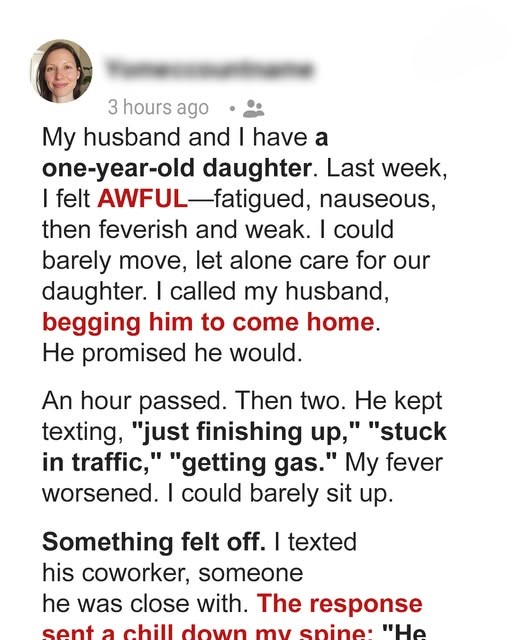“I really need you,” I whispered, struggling to speak. “I’m sick. I can’t even get up to take care of Lily.”
He paused before saying, “I’ll wrap things up here and be home in twenty minutes.” I clung to that promise with everything I had. But twenty minutes became an hour. And then two.
Each time I texted, he had a new excuse. “Leaving soon.” “Just stuck in traffic.” But we lived in a small town. The drive from his office to our house was fifteen minutes, tops. Something didn’t add up.
Meanwhile, my fever climbed higher. I couldn’t sit up. I couldn’t feed my daughter. I couldn’t keep anything down. I sent another message, this time to Mike, one of Ryan’s coworkers.
“Is Ryan still at the office?”
Mike replied almost instantly:
“Yeah, he’s still here. Why?”
That message was the turning point. It confirmed what I had feared—Ryan never left work. He wasn’t on his way. He had lied.
Desperate and dizzy, I called our neighbor, Mrs. Thompson. “I need help,” I rasped. “I think I need to go to the hospital.”
She didn’t hesitate. Minutes later, she was by my side, gently lifting Lily and helping me into her car. I don’t remember much after that—just flashes of light, the sound of monitors, and the sting of an IV going into my arm.
“You were dangerously close to septic shock,” the doctor told me. “A severe kidney infection, likely untreated for days. A few more hours, and this might have been a very different outcome.”
It was Mrs. Thompson who saved me—not Ryan.
Two hours later, Ryan showed up at the hospital. He walked in holding a coffee cup and scrolling through his phone, as if he’d just run a quick errand.
“You okay?” he asked, barely glancing at me.
“I begged you,” I said, my voice barely audible.
He shrugged. “I didn’t realize it was that serious. I figured you were just… exaggerating.”
For the next two days, I stayed in the hospital, slowly recovering. My parents drove four hours to pick up Lily. They were shaken. My mother barely left my side, and my father’s silence toward Ryan said everything.
Ryan came once. Brought me water and a snack. Said something about how “these things happen.” Then left again.
When I was finally discharged, I felt more numb than angry. On the ride home, Ryan chatted about work and traffic like nothing had happened. I listened in silence, replaying the doctor’s words:
A few more hours.
That night, lying in bed next to him, I stared at the ceiling. I thought about Lily. What if it had been her lying there, unable to cry for help? Would he have shown up then?
After he fell asleep, I picked up his phone.
I wasn’t looking for proof—I already had that. I needed clarity. And I found it. Dozens of flirtatious texts with other women. Inside jokes. Emojis he never sent me. Casual conversations about drinks and plans, all while I was lying in a hospital bed.
There was no sign of concern about me. No calls. No messages about my condition. Just memes, TikToks, and laughter. I checked his email—no requests for time off, no alerts to his boss. He never even intended to come.
I put the phone back and lay awake until dawn. By morning, my decision was made.
I scheduled a consultation with a divorce attorney. It wasn’t a reaction born of fury—it was a decision grounded in truth. The man lying next to me would never show up when it counted.
Over the following weeks, I started searching for a new place. With Lily in tow, I planned quietly, calmly. Ryan acted as if everything was fine. He laughed at his own jokes, scrolled through his phone, touched my arm like nothing had changed.
But I had changed.
The woman who once made excuses for him was gone. In her place stood someone who understood what it meant to be alone in a moment of need—and to survive it.
I don’t know the exact day I’ll leave. But when I do, I won’t say a word.
Because now, I know what silence can cost.

